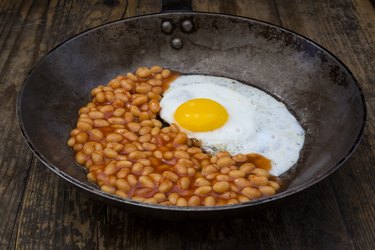
If you love baked beans, it's good to know that this classic comfort food can be a healthy addition to your weight-loss program under certain circumstances. Beans are nutritious — low in fat and calories and high in dietary fiber — and they are also a good source of protein and minerals. However most baked bean dishes contain sugar — sometimes a lot of it. When your goal is weight loss, skip canned or restaurant baked beans and make your own sugar-free or low-sugar version at home.
A Healthy Main Ingredient
Video of the Day
There is no denying that beans are useful for weight loss. A meta-analysis published in the American Journal of Clinical Nutrition in 2016 concluded that eating beans and other pulses may reduce body fat and aid in weight maintenance, even without restricting calories. The researchers analyzed past clinical trials on the effects of eating pulses and found that diets consisting of a daily serving of beans led to significant weight loss over a six-week period compared to diets without pulses.
Video of the Day
Watch Out For Sugar Content
You don't want added sugar in your baked beans to sabotage your weight-loss efforts. Sugar content in canned baked beans varies according to the brand and may be much more than in homemade. It is definitely worth being a label reader when it comes to buying baked beans.
For example, Heinz baked beans with tomato sauce has 7 g of sugar per half-cup, according to the USDA Branded Food Products Database. That's almost 2 teaspoons of sugar, some of which comes from the tomato sauce. The type of bean used to make baked beans is typically navy beans. The USDA National Nutrient Database lists the sugar content of navy beans at only .46 g per half-cup; if you prepare your own baked beans, even after adding the tomato sauce, you can reduce the sugar content substantially.
Feeling Full Can Help With Weight Loss
Knowing which foods make you feel fuller longer may help you lose weight and keep it off. Many weight-loss diets fail due to hunger and food cravings. According to the USDA National Nutrient Database, a half-cup serving of baked beans, which contains 194 calories, has almost 7 g of belly-filling fiber that helps slow down digestion, keeping you feeling full for longer.
Beans as a fiber source may be more satisfying than meat. According to a study published in 2016 in the journal of Food and Nutrition Research, vegetable-based meals, such as baked beans, had more of an effect on suppressing appetite than animal-protein meals.
A study published in 2013 in the Journal of ISRN Obesity, used a group of men and women, aged 18 to 70, to examine the feasibility of dry beans for high-fiber weight loss compared to a source consisting of fruits, vegetables and whole grains. Subjects in the bean group lost weight during the 4-week treatment and reported satiation and a reduction in hunger. These findings support the importance of fiber for weight loss and weight management.
Read More: List of High-Fiber, Low-Calorie Foods
Weight Loss and Low-Gl Foods
Many popular diets are based on the glycemic index (GI), including the Zone Diet, Sugar Busters and the Slow-Carb Diet. The University of Sidney explains the glycemic index as a ranking of carbohydrates on a scale from 0 to 100 according to how fast and how much they raise blood sugar levels after being eaten. Any food that has a GI of 55 or less is considered to be a low-GI food.
The GI score of dried navy beans used in baked beans is 31 per 150 g, according to Oregon State University. The University of Sidney lists Heinz regular baked beans at a GI of 40 per 150 g, which makes them a low GI-food. If you make your own at home, using stevia as a sweetener will not increase the GI score.
Brazilian researchers conducted a study, published in the Archives of Endocrinology and Metabolism in 2015, which investigated the effect of GI on weight control. They found that after 45 days, the group that ate a low-GI meal twice a day lost more weight than the group that consumed high-GI meals.
Calorie Crunching
Cut some of the calories by making your own healthy baked beans. A good sugar-free baked beans recipe by nutritional therapist Angelique Panagos uses the sweetness of cinnamon and sweet potatoes, no sugar needed.
You could also modify your favorite recipe and substitute the sugar or molasses with natural sweeteners such as stevia or sugar-free applesauce. If you like the convenience of opening a can of baked beans for a low-fat snack, choose a product with no added sugar, such as Heinz No Added Sugar Baked Beans, naturally sweetened with stevia plant extracts.
- USDA National Nutrient Database: Beans, Baked, Canned
- USDA Dietary Reference Intakes: National Academies
- Food and Nutrition Research: Meals Based on Vegetable Protein Sources (Beans and Peas) are More Satiating than Meals Based on Animal Protein Sources (Veal and Pork) - a Randomized Cross-over Meal Test Study
- PubMed.gov: Dietary Adherence and Satisfaction with a Bean-Based High-Fiber Weight Loss Diet: A Pilot Study
- Archives of Endocrinology and Metabolism: Effect of Glycemic Index on Obesity Control
- The University of Sidney: About Glycemic Index
- Angelique Panagos Nutritional Therapist: Sugar-Free Baked Beans
- Heinz Creationz: No Added Sugar Beanz
- PubMed: Effects of Dietary Pulse Consumption on Body Weight: a Systematic Review and Meta-Analysis of Randomized Controlled Trials.
- University of Toronto News:Beans, peas, chickpeas, lentils Increase Fullness and Could Help Manage Weight
- University of Sydney: GI Foods Advanced Search
- Oregon State University: Glycemic Index and Glycemic Load for 100+ Foods
- USDA National Nutrient Databasse: Beans, Navy, Mature Seeds, Cooked, Boiled,
- USDA National Nutrient Database: HEINZ, Beans With Tomato Sauce